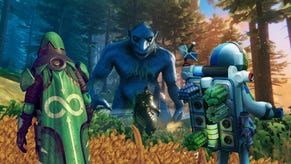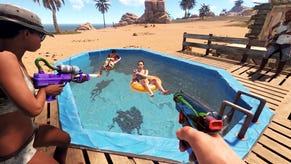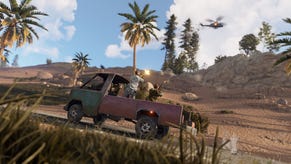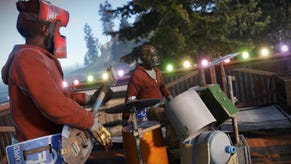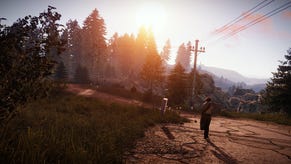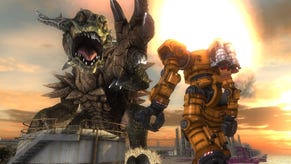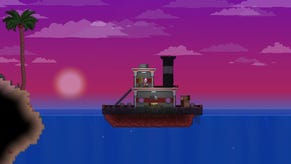Rust: still a game of singular brutality, even 4 years on
The end of the world for real
Thunk. Thunk. Thunk. I cannot see the source of the dull, relentless sound, but my ears tell me is that it is close by. My chest anxiously thumps its own tattoo in reply, and I have to stamp down an illogical fear that the beating of my hideous heart is a telltale to my own location. Birds do not thunk. Boars do not thunk. Deer do not thunk. Even educated fleas do not thunk. Only people thunk.
Somewhere nearby, another human being is grimly and mechanically hitting a tree with a rock, over and over again, and I've never been more terrified in my life. Rust [official site], old man - you've still got it.
Rust was and is an upstart - an early access, rough-edged agent of chaos despite its eyewatering commercial success - but these days it's an old grandee of multiplayer survival games too. With dozens of rivals, and a Steam man-killing community that spends more time gazing adoringly at PlayerUnknown's Battlegrounds and King of the Kill than it does making eyes at the direct descendants of DayZ and Minecraft, does Facepunch's craft'n'gank 'em up still feel fresh?
Surprisingly so. I've played many of Rust's contemporaries and successors, but have spent no time with Rust itself outside of fleeting experimentation with its earliest release. I've been murdered by cannibals, munched by zombies, mauled by wildlife and ganked by players in home-made armour more times and in more places than I can count, and while some are compelling and some are wretched, they are broadly similar experiences.
There's something about Rust. It makes my nerves spasm and spike in a way its rivals do not. Ice ricochets through my veins at the slightest hint of another player's presence. The distant thunk of stone against wood, even the glint of moonlight across one of the bare arses this game is notorious for: my instincts scream danger.
Rust feels like a game at the end of the world. Not some science-fictional post-apocalypse, but the total disintegration of what we might call 'humanity' - a mindset that Rust's players have absolutely embraced. There is a cold and frightening brutality here that somehow goes beyond the casual cruelty of most any other survival game of this type.
This is hard to quantify, but let me put it like this: if I encounter another player in another game like this, I generally feel that there is a 50% chance they will attack me on sight (or, often, before sight - the sudden blow to the back of the head is a grimly familiar experience). In Rust, I would put that chance at 90%. Something about this world makes people murderous, plain and simple. I am accustomed to being killed because I might carry useful items, because I present an obvious threat or for trespassing near someone's home or base. Rarer is to be killed - not just killed, but pursued relentlessly until I am killed - simply because I am there.
Rust has a system whereby it openly declares the vulnerability of a new players, and thus in theory the pointlessness of killing them. This system is quite famous, because it involves schlongs and racks. You are born into a server in your birthday suit (and in a randomly-allocated body, whose sex and race as well as specific physical attributes are not of your own choosing. This is a feature I appreciate, because it amps up that sense of random birth into a truly wild place, rather than heroic arrival into one you believe you can conquer.) There is no clearer sign of fragility than bare skin. It should be quite obvious that someone wearing nothing a) possesses nothing of value b) presents no threat to someone who does.
It should be comic. Boobs and bums and balls are funny. And there's the question of which orifice acts as the inventory for someone without clothing, and how uncomfortable that orifice must be given that each newly-spawned player carries a large boulder and a foot-long wooden torch with them. All these starkers people running around, rocks implicitly lodged in their rectums: Rust is a patently ridiculous game.
Yet it's not. It's bloody chilling. Part of the reason for that is the fact of getting murdered while naked and all but defenceless. It will happen to you in short order, and it did to me, repeatedly, but somehow even more frightening was witnessing it happen to another player - an armoured man with a machete chasing down a naked, hairless newcomer mere moments after they first woke up on a hitherto serene, twilight-lit beach. Goliath vs David, but before David had even put his trousers on. Butchery. Slaughter. The pointlessness of it. The sport of it. I crept away, unnoticed but quaking with real distress.
Often, I would encounter a fellow nudie newbie. We would stare warily at each other from afar, perhaps perform the silent bunny-hops that denote friendliness, or perhaps the other would address me cheerfully via their microphone. Nothing would happen, so I would presume we had both decided this town was big enough and run off. Moments later, thunk. Not a tree, this time. Their rock was removed from its sticky hiding place, and found a new home at the base of my skull.
Why? To what end? A second rock and another torch are of almost no benefit to even the most freshly-spawned nuddy psychopath, after all.
The answer is simple: because I might have done the same to them. The dog eat dog mentality rules here, even in a game which visually screams out how fragile a new player is, because the only way to ever get ahead is to not be dead. The elaborate-but-wonky bases I occasionally stumbled into (and often died in, due to an excess of traps), the hulking armoured forms of advanced, gun-wielding players I often saw (and was summarily murdered by) - these things simply could not exist if any concessions were made towards others. Another player is a risk. There is only one way to manage that risk.
On the server chat channel, I watched two players engage in a long, surprisingly restrained discussion about why one had murdered the other twice, given that they had been chatting amiably this way beforehand, given that explicit arrangements for co-habitation had been made.
The killer offered various justifications - I thought you were someone else; because you were in my base and that violates our treaty - and the victim offered mealy-mouthed protest, but both knew the true, unspoken reason, as did all we invisibles who rubber-necked at this conversation. Because if I didn't kill you, you'd have killed me. Everyone here smiles at each other, while holding a faeces-flecked boulder behind their back.
The closest thing I saw to mercy was when I, once again running around in the nip as a result of recent murder, ran too close to a more veteran player's base. Some black knight, faceless and silent and frightening, charged out of nowhere, struck me with some sort of blade and rendered me instantly incapacitated. But not dead. He stood over me for a moment, a dark metal tower of implied violence, and I braced for the killing blow.
It never came. Instead, I found myself restored unexpectedly to my feet. The would-be murderer had healed me. I was stunned.
As he returned to his fortress, I realised that was not all he'd done. I still had my torch, but my rock - my precious rock, the only way to harvest wood and stone and begin on the long trek to building anything of use - was gone. A sensible move on his part: without the rock, I could not take advantage of his moment of weakness by immediately sneaking back and smacking him around the back of the head with good ol' rocko. I dismissed concerns about quite how gruesome its removal process would have been, given I had not been holding it in my hands at the time of our encounter, and instead thought about the practicalities of my new situation. And the world fell away.
No rock. Not resource-harvesting. No clubbing animals for food. No nothing. This act of mercy was in fact a fate worse than death.
I knew that it was possible to find rocks strewn on the shore or the forest floor. My health low and my belly rapidly emptying, it was to this that I desperately turned my attention. It was a miracle that I was not beaten to death by a passing sadist as I ran around, staring intently at the floor, but perhaps that would have been real mercy. Instead, rockless, and also not fortunate enough to find a mushroom or two to eat, I slowly starved to death. (Perhaps there were other ways to avoid this - I am too new with Rust to know, and my window of life that time too short to discover them by myself).
Did my saviour-killer truly know what he was doing when he took my rock - that he consciously condemned me to a slow death, that he might as well have been taking my sight or my hands? Or am I giving him far too much credit by far, and all he thought was "ooh, a rock, I'll have that"?
I keep on thinking about Rust in a way I haven't about many other survival games I've played (the early days of DayZ being the most notable exception). The true lawlessness and danger of it. The singular atmosphere of a game that truly feels set after the end of the world, not just in its weird ruins - the vaguely Soviet-era structures and random radar dishes juxtaposed with paradise beaches - but in the brutality and crudity of its scant society.
Not just in the physical behaviour of others, but in their communication too. Clearly, walking past a locked building with a sign reading 'COCK' scrawled on it is the very height of comedy, but for all its dumb inanity it somehow endorses the sense of this being a world returned to savagery. If we see people, we kill them. If we can't see them, we leave barked, monosyllabic insults for them.
Even the laughably basic crafting mechanic in Rust - repeatedly, mindlessly hitting a tree with a rock, and somehow ending up with usable 'wood' with which to build hatchets and hammers and doors out of - ends up supporting its lunkheaded barbarism rather than being the dissonant, overly game-y misfire of an early survival vs. Minecraft game.
I wanted to be a good man. I did not kill others, or wreak sadistic acts of mercy, or even try to scare them away. I politely let them pass, or hid until they had. My reward was only ever death.
Later. A small hut to call my own, a locked door, a furnace smelting ore, a campfire roasting meat, my delicate skin clad in cloth and hide, a blade in my hand at last. A moment if, of not security, then at least not of absolute fragility. I wandered out, in need of a little more wood for the fire. It was night. The surface of a nearby lake danced in the moonlight. And something else.
A bald pate, pale limbs, chest, groin and buttocks as bare of the rest of them. Moving towards my fire, my place, my things. I hid behind a bush and watched. Noticed the rock in their hands. Looked down at the blade in mine.
I have another rock now.









